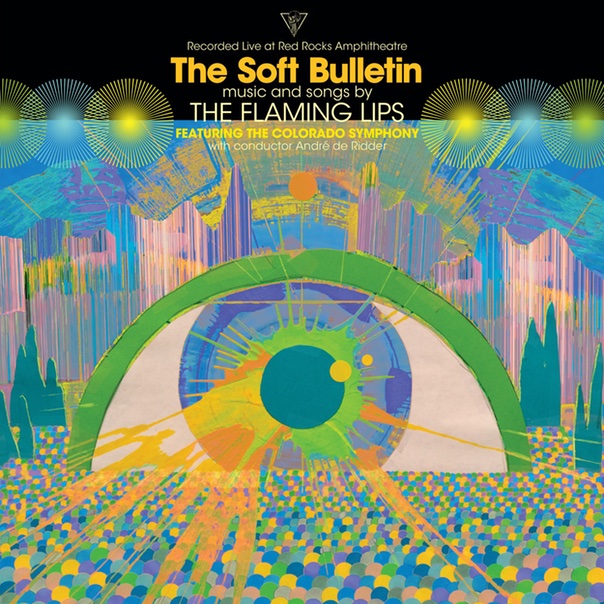REVIEW: The Flaming Lips orchestrate ‘The Soft Bulletin’ in technicolor rerelease

LSD can make the environment seem more vibrant; vivid colors throb and pulsate, and sounds take on new contortions. A band long associated with mystical voyaging, The Flaming Lips performed their legendary 1999 album, The Soft Bulletin, with the 68-member Colorado Symphony and a 57-voice choir for a very lucky audience at the Red Rocks Amphitheatre in Morrison, Colorado in 2016.
The Soft Bulletin: Live at Red Rocks
With the Colorado Symphony
The Flaming Lips
Warner, Nov. 29
The band is now releasing the recording of the show to commemorate the 20th anniversary of the original album. The live release feels like the original album, only more vibrant.
The Soft Bulletin marked a turning point in the Oklahoma City rockers’ career, from lo-fi garage rock freaks blowing out people’s ears in small clubs to mainstream musicians transforming arena shows into psychedelic multimedia extravaganzas.
Twenty years is a long time in terms of musical technology. This release of The Soft Bulletin reverberates with the power of this new technology as well as attesting to The Flaming Lips’ stature in the music industry. This album obviously cost a lot to make.
After some crowd noise and a slow orchestral build, the warped string melody of “Race for the Prize” fills the soundscape. The orchestra adds to the song’s immensity without altering its feel. Rock bands sometimes hold back when they play with a symphony—Metallica, I’m glancing in your general direction—but this isn’t a problem here.
The songs don’t feel any less weird, but the improved sonic quality makes it feel like your ears have popped or you’ve just emerged from the birth canal. Suddenly, there’s a lot more to hear. When the orchestra drops out, Coyne’s singing becomes more cozy and personal against a minimal groove. This juxtaposition of larger-than-life enormity and intimate emotion perfectly captures the song’s story of scientists confronting the immensity of the world’s problems.
Likewise, “A Spoonful Weighs a Ton” begins with a gentle orchestral backing for the first few verses. Ninety seconds into the song, drummers Matt Duckworth Kirksey and Nick Ley deliver the song’s signature drum beat at a size worth of John Bonham. It’s augmented by a much fuller bass line from the band’s longtime bassist, Michael Ivins.
The gentle electric guitar and glitchy percussion programming of “The Spark That Bled” sound similar to the original, thickened with thunderous, booming timpani hits.
The orchestra and choir, conducted by Andre de Ridder, serve the album’s material best when they emphasize the incredible musical dynamism. The album excels at huge, slow musical builds from the quietest whisper to massive apogees. The album’s quiet and minimal moments—like the nearly a capella intro to “What is the Light?”—are not needlessly ornamented with additional ear candy. This helps to preserve the effect when sudden waves of form and crash over the listener.
The sparse bass and keyboard intro to “The Observer” is slowly augmented by a brass section in a beautiful slow-burning build that spans the song’s nearly five-minute runtime. The occasional whistle or scream from the audience ultimately adds to the experience, serving as a reminder that people witnessed this performance in real time. Very little dialog with audience appears, save for a quick ‘Thank You’ and Coyne persuading fans to make insect noises before “Buggin.”
One of The Flaming Lips’ most powerful songs, “Waiting For Superman,” begins with sparse, impossibly intimate piano. Once the choir joins, it feels more like 50 backup singers than a choir. In “Suddenly Everything Has Changed” the relatively conventional vocals, bass, drums, keys and guitars replicate the original, but sound quality is much better—even when listening to the MP3s. Audiophile fans with expensive stereos will experience the detail.
The album’s most ambitious moments come during “The Gash.” The song’s 30-second buildup featuring the choir and orchestra evokes the grandiosity of Pink Floyd’s The Wall. Simple piano chord progression is undergirded by a swelling low end. The resulting sonic bigness feels like it could probably be heard from space.
The approximately 70-minute album’s coda comes with the intricate instrumental “Sleeping on the Roof.” The song gently and steadily adds instruments to the repeated melody to a hypnotic, if not downright spiritual effect.
The album feels like an attempt to immanentize the eschaton—to create heavenly perfection here on Earth. A sense of transcendence and triumph permeates. It’s sublime in the way the word meant a couple of centuries ago: a phenomenon of such magnitude that you are struck by your own insignificance.
Perhaps the only thing that could make this release any more vibrant, while still legal, would be to include a film of the momentous performance.
Follow writer David Gill at Twitter.com/Songotaku.
